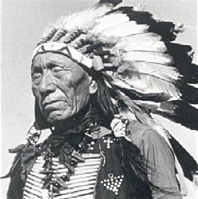
“It is good to have a reminder of death before us, for it helps us to understand the impermanence of life on this earth, and this understanding may aid us in preparing for our own death. People who are well prepared know that we are nothing compared with the Great Spirit, who is everything; then we know that world which is real.”
Black Elk
Our cover quote for the fall/winter 2016 print edition comes from a revered Lakota healer and holy man who lived between 1865 and 1950. During that time Black Elk’s world was subjected to catastrophic change. He participated in the Battle of Little Bighorn and survived the massacre at Wounded Knee. His people suffered unimaginable losses of life, land, sacred places, and cultural traditions.
We can say Black Elk witnessed the death of an indigenous way of life that existed for thousands of years. He did so just as surely as we’re watching death today — from Aleppo to poison pipelines to dead zones off the coast of America, whole cities and sacred sites and ecosystems killed by greed.
But to say this with genuine intelligence requires us to reflect on something crucial. We need to pause and consider what death is.
Some words are so familiar that we assume their meaning is self-evident. We first hear them as children and ask questions of busy adults who often teach us how to use them without giving them much thought.
I passed death recently on the road to work, driving by the lifeless body of a young coyote. The next day my daughter saw another crumpled pup nearby, probably a sibling. One moment they’d been bundles of conscious furry matter, eons of molecular magic in the making. Then cars came along in the rush of routine and extinguished their lives.
What were they then? What will every commuter on life’s road be when Maxwell’s hammer comes down on our heads?
Black Elk could have answered that question with more direct experience than the average human being. He came near to death twice during his lifetime – first when he became terribly ill at the age of nine and again when he lost consciousness for three days at age 26. Both occasions taught him that reality is more than material existence.
His words on the cover are translated to convey a fleck of that understanding. The expression Great Spirit is used because it was often associated with Black Elk’s statements and is familiar to contemporary American readers. Lakota activist Russell Means preferred Great Mystery, yet some practitioners believe this can be misinterpreted as a huge question mark. So Great Spirit is applied here.
Black Elk’s actual words in Lakota are Wakan Tanka, which literally means Big Sacred. As with many indigenous people, Lakota tradition affirms the essential connection between Creator and creation. Everything is related, and human beings are part of that vast sacredness.
Some days it seems we are moving toward a future in which nothing is sacred. Art plays a critical role in changing that trajectory, in motivating people to think about our relationships with each other and the planet. Here at the Edge we add our small part by sharing words and images while enjoying ourselves.
Thank goodness for writers and artists who support this undertaking. Hats off to business people who help fund our work by advertising, trusting without knowing how the contents will unfold. We pick a different theme for every print edition. Sometimes they’re challenging.
Death is a mystery, yet it teaches us how to behave. We come closer to understanding by doing our best with what remains.
I spoke to the pups as I lifted their bodies into the truck, telling them I was taking them to a good place in the forest. On the way I sang a song I learned from the cedars. Going up the last hill I carried them under each arm, then laid them side by side on a bed of moss. I knelt in the rain beside their beautiful bodies, and felt a little more connected with everything.
For transformation we work. Some pray.
Yes, stimulating essay, thanks. Black Elk Speaks!